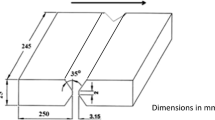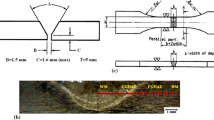Abstract
The present study evaluates the influences of PWHT on FCG behavior and tensile properties of TIG butt welded Al 6013-T4 sheets. Crack propagation tests were carried out on compact tension (CT) specimens. The T82 heat treatment was varied in three artificial aging times (soaking) of 6, 18 and 24 hours. The results of T82 heat treatment with artificial aging variations were tested for their fatigue crack growth rates at the main metal zone, the heat-affected zone (HAZ), and the welded metal zone. It has been observed that the various agings in heat treatment T82 are sensitive to the mechanical properties (fatigue crack growth rate test, tensile test). The results show that PWHT-T82 for 18 hours aging is the highest fatigue resistance, while the aging 18 hours provided the highest tensile test result.
Similar content being viewed by others
References
Y. Birol, Improvement in Bake hardening response of a twin-roll cast Al-Mg-Si sheet, International Conference on Aluminum 2004, Subodh K. Das, Ed., The Minerals, Metals & Materials Society, TMS (2004).
R. Manti, D. K. Dwivedi and A. Agarwal, Pulse TIG welding of two Al-Mg-Si alloys, ASM International, 17(5) (2008) 667–673.
A. G. M. Pukasiewicz, S. L. Henke, W. J. P. Casas, Effect of post-weld heat treatment on fatigue crack propagation in welded joints in CA6NM martensite stainless steel, Welding International, 20(12) (2006) 947–952.
V. Balasubramanian, V. Ravisankar and G. Madhusudhan Reddy, Effect of postweld aging treatment on fatigue behavior of pulsed current welded AA7075 aluminum alloy joints, ASM International, 17 (2008) 224–233.
S. J. Maddox, Review of fatigue assessment procedures for welded aluminium structures, International Journal Fatigue (2003) 1359–1378.
C. Wang and Y. Chang, Effect of post-weld treatment on the fatigue crack growth rate of electron beam-welded AISI 4130 steel, Metallurgical and Material Transactions, 27A (1996) 3162–3169.
F. Bergner, G. Zouhar and G. Tempus, The materialdependent variability of fatigue crack growth rates of aluminum alloys in the Paris regime, International Journal of Fatigue, 23 (2001) 383–394.
Standard test method for measurement of fatigue crack growth rates, ASTM E 647-08, American Society for Testing Materials (ASTM), New York (2008).
E. L. Rooy, Introduction to aluminum and aluminum alloys, ASM Handbook, Volume 2.
C. R. Brooks, Heat treatment, structure and properties of nonferrous alloys, ASM Handbook volume 4.
T. V. Rajan, C. P. Sharma, Ashok, Heat treatment, Prentice Hall of India, New Delhi (1997).
Welding Handbook, Fundamentals of Welding, 7th Ed., volume 1. American Welding Society, Miami (1976).
S. Kou, Welding Metallurgy, Willey Inter-Science, Canada (2003).
S. Malarvizhi, K. Raghukandan and N. Viswanathan, Investigations on the influence of post weld heat treatment on fatigue crack growth behaviour of electron beam welded AA2219 alloy, International Journal of Fatigue, 30 (2008) 1543–1555.
H. O. Fuchs and R. I. Stephens, Metal fatigue in engineering, John Wiley & Son, New York (1980).
L. W. Tsay, C. C. Liu, Y. H. Chao and Y. H. Shieh, Fatigue crack propagation in 2.25 Cr-1.0Mo steel weldedments in air and hydrogen, Material Science & Engineering, A299 (2001) 16–26.
J. C. Huang, C. S. Shin and S. L. I. Chan, Effect of temper specimen orientation and test temperature on tensile and fatigue properties of wrought and PM AA6061-alloy, International Journal of Fatigue, 26 (2004) 691–703.
Y. L. Liu and S. B. Kang, The solidification process of Al-Mg-Si alloys, J. Mater. Sci., 32 (1997) 1443–1447.
E. Donnelly and D. Nelson, A study of small crack growth in aluminium alloy 7075-T6, International Journal of Fatigue, 24 (2002) 1175–1189.
C. Eripret and P. Hornet, Prediction of overmatching effects on the fracture of stainless steel cracked welds, in Mismatching of Welds, ESIS 17, K.H. Schwalbe and M. Kocak, Eds., Mechanical Engineering Publications, London (1997).
D. C. Lin, T. S. Wang and T. S. Srivatsan, A mechanism for the formation of equiaxed grains of Aluminium-Lithium Alloy 2090, Mater. Sci. Eng. A, 335 (2003) 304–309.
N. B. Potluri, P. K. Ghosh, P. C. Gupta and Y. S. Reddy, Studies on weld metal characteristics and their influences on tensile and fatigue properties of pulsed current GMA welded Al-Zn-Mg alloy, Weld Res (1996) 62–70.
Author information
Authors and Affiliations
Corresponding author
Additional information
This paper was recommended for publication in revised form by Associate Editor Youngseog Lee
Gunawan Dwi Haryadi, Ph.D Candidate in the Department of Mechanical Design Engineering of Pukyong National University. He received the B.A. degree from Diponegoro University, Indonesia, in 1995 and M. Engineering degree from Gadjah Mada University, Indonesia, in 2002. His main research interest is the development of fatigue crack propagation life prediction.
Seon Jin Kim, Professor in school of Mechanical Engineering of Pukyong National University since 1994. He obtained the Ph.D degree from Yokohama National University, Japan, in 1993. He worked at Texas A&M University as a visiting Scholar from 1997 to 1998. His research interests are in mechanical behavior of materials, fatigue analysis and structural reliability engineering fields.
Rights and permissions
About this article
Cite this article
Haryadi, G.D., Kim, S.J. Influences of post weld heat treatment on fatigue crack growth behavior of TIG welding of 6013 T4 aluminum alloy joint (Part 1. Fatigue crack growth across the weld metal). J Mech Sci Technol 25, 2161–2170 (2011). https://doi.org/10.1007/s12206-011-0530-9
Received:
Revised:
Accepted:
Published:
Issue Date:
DOI: https://doi.org/10.1007/s12206-011-0530-9




